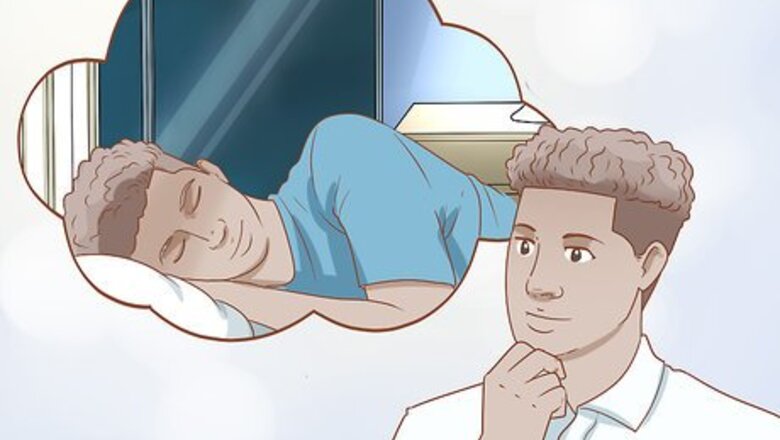
views
Deciding When to Go to Bed

Decide what going to bed early means to you. “Early” and “late” are relative terms when describing sleep times. Much depends on when you need to or are able to wake up each day, and how much sleep you are getting. There is some variation from person to person, but generally adults need 7.5 to 8.5 hours of sleep per day. Children (5 years old and up) and teenagers will need more sleep than this, ranging from 8.5 to 11 hours. Infants and toddlers will need even more.

Pick a good bedtime. Choose a bedtime that is early enough for you to get the right amount of sleep, according to your age and schedule. If you want to figure out exactly how much sleep you need or are getting, consider using a sleep journal. Simply record when you go to bed each night and when you wake up each day, and calculate the hours of sleep you had in between. If you record your sleep for a few days or weeks, then you can also calculate your average amount of sleep.
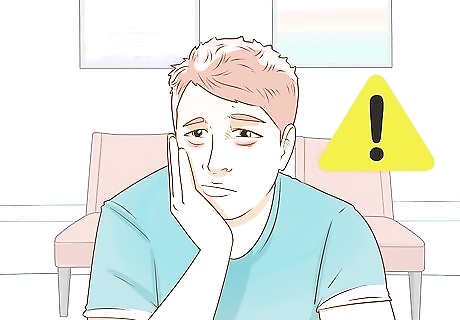
Recognize that inadequate sleep can be unhealthy. Staying up late can be unhealthy when it becomes a long-term habit. Going to bed late and sleeping in can contribute to weight gain and diabetes, correlate to poor nutrition, and other issues. Just acknowledging the importance of your sleep needs can help you start to improve your situation.

Recognize that good sleep is necessary for optimum brain function. Not getting enough sleep can have a negative impact on memory, alertness, focus, and other cognitive functions. If you want to succeed in school, work, or other activities, let this be a motivation for you to go to bed early. If you have to pull an "all-nighter" for school or work, clear your schedule the next day so that you will be able to concentrate solely on these tips for going to bed early. You'll need to recover from the lack of sleep.
Preparing for Sleep During the Day
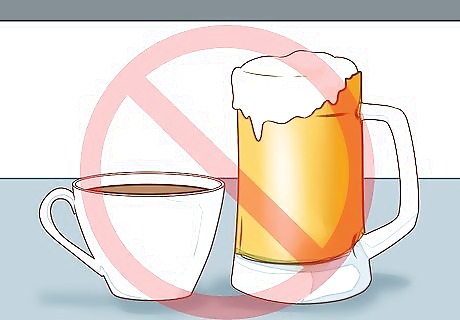
Avoid stimulants and depressants. If you trying to go to sleep early, avoid coffee and other caffeinated products, nicotine, and other stimulants. Their effects can last for hours, making it hard to go to sleep when you want to. And while depressants like alcohol can initially make you feel sleepy, they can actually disturb your sleep. Sleeping pills are often used as a means of inducing sleep. However, these can often be habit-forming, can impair memory and motor skills, and actually disrupt sleeping patterns. There are many different types of sleeping pills and their effects vary, so you should carefully follow the instructions of all over-the-counter and prescribed pills, and talk to your doctor if you have questions or concerns.
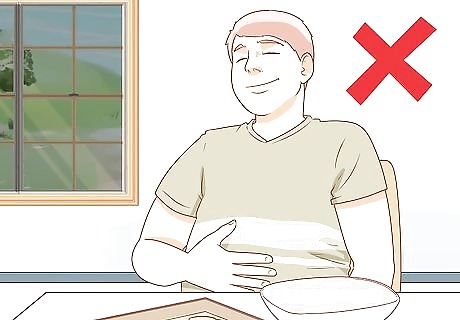
Don’t eat too much at night. Your last meal should be no less than 2 or 3 hours before your bedtime. If you eat a big meal close to bedtime, it can make it hard to get to sleep and stay asleep.
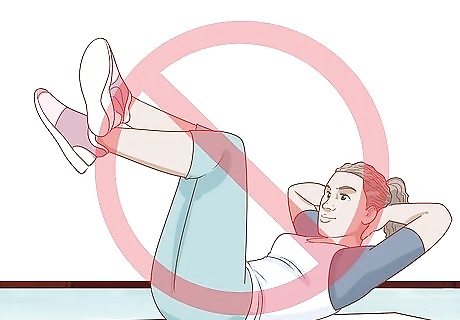
Avoid exercising too close to bedtime. Regular exercise will help regulate your sleep patterns, but you should not exercise too close to your bedtime. Exercise has a stimulating effect that might make it hard to go to bed early.
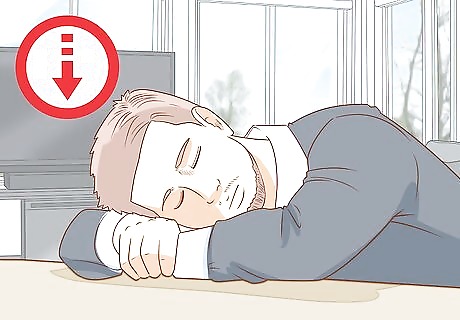
Limit naps. Naps can help if you are tired, but you should avoid long naps (longer than a half-hour), and naps near your bedtime. Otherwise, you may have trouble going to bed early.
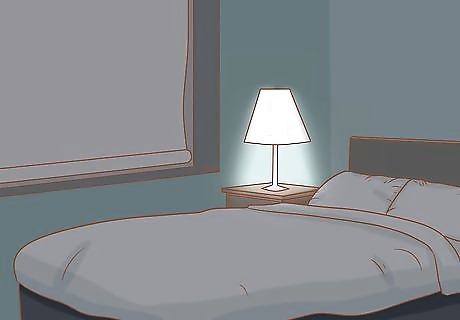
Monitor your lighting conditions, particularly late in the day. How much and what kind of light you are surrounded by has a direct effect on your sleep patterns. Get plenty of natural light in the morning and during the day, then keep the lights dim at night. This will help you to get to bed early. Wearing sunglasses later in the day dims light, which can help you become sleepy on time. Avoid television, computers, tablets, smartphones and similar devices when you are trying to go to bed early, as the blue light from electronic screens disrupts the body’s inclination to sleep. If you work nights and need to sleep during the day, wear yellow- or orange-tinted glasses. This will block out blue light, which signals your body to stay awake.
Establishing the Right Environment for Sleep
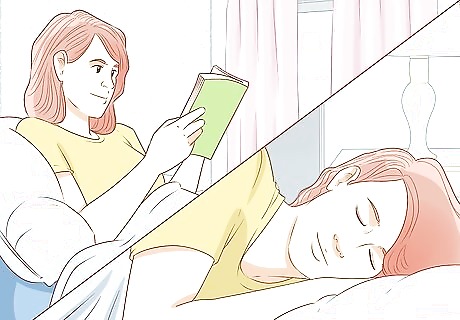
Establish a sleep routine. Get your body and mind used to going to sleep early by doing the same things each night before you go to sleep. Do whatever relaxes you: read a book, take a bath or shower, listen to relaxing music, etc. Many people find that warm drinks or tea can help them become comfortable and sleepy (just stay away from caffeinated beverages). Chamomile tea is a good choice because it has a calming effect. Meditation and/or breathing exercises are also recognized as calming techniques. A simple breathing exercise is to inhale for a count of 3 or 4, then exhale for a count of six or eight. A few repetitions of this can be very helpful when trying to calm down and go to bed early.
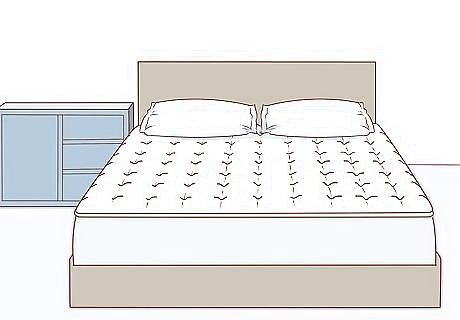
Make sure that your bedroom is relaxing. This means having a comfortable mattress, bedding, etc. Some people find it helpful to use aids to lessen outside distractions, like earplugs or the white noise of a small fan or other device.
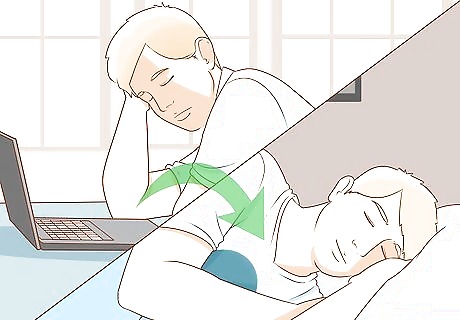
Go to bed when you feel tired. If you feel tired, it means you should go to bed. Don’t force yourself to stay awake. On the other hand, if you’re not tired, don’t try to force yourself to sleep. If you are tired, but can’t seem to fall asleep within 20 minutes, then get up and do something calming or boring (avoid electronic devices, exercise, working, eating, etc.) until you feel tired again. Eventually, you should be able to reach your early bedtime more consistently.
Making an Early Bedtime a Habit
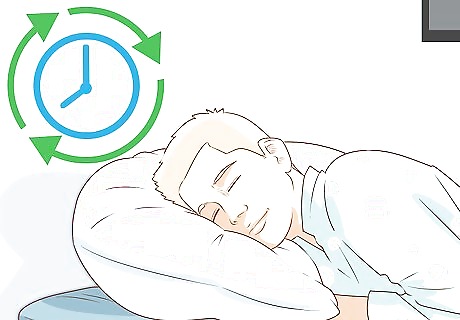
Make your bedtime consistent. Going to bed the same time every night will improve your sleep, and make it easier to go to sleep early.
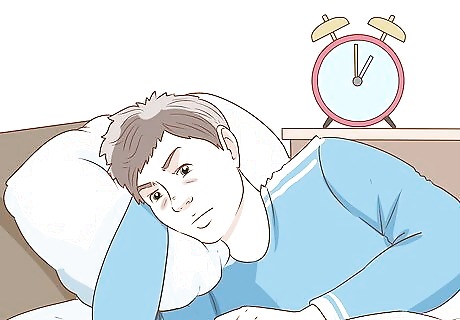
Don’t expect huge changes right away. If you are trying to shift your sleep schedule to an earlier time, don’t expect to easily make a drastic change in one night. Try making changes in incremental steps. For instance, if you have been going to sleep at 11:00, and decide that you want an earlier bedtime of 10:00, don’t expect to jump back the whole hour on the first night. Instead, try going to bed for a few nights at 10:45, then a few at 10:30, then a few at 10:15, before hitting your goal of 10:00.
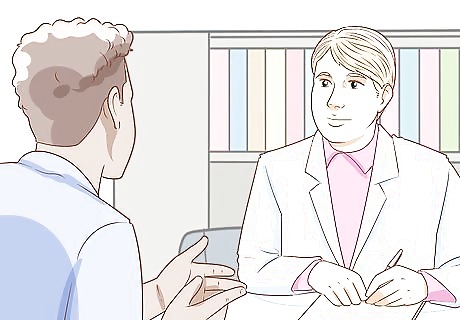
Know when to contact a professional for help. If you are having serious problems sleeping, staying asleep, moving to an earlier bedtime, or keeping a consistent sleep pattern, it could be a symptom of another issue, or may require the assistance of medical professionals. If you have concerns, seek expert medical advice.


















Comments
0 comment